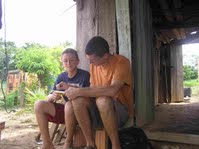Lesley Jo:
As a medical anthropology student, I am interested in chronic disease and mental health among urban middle- and upper-class women in New Delhi. India currently harbors approximately 40 million people with type 2 diabetes--more than any other country in the world--and projections estimate that this number will double by 2030. Type 2 diabetes management requires major diet and lifestyle changes and complex medication regimes (sometimes including daily injections). It may create problems regulating mood, and nearly always carries a significantly higher risk of amputation, blindness, and neuropathy, reduced physical mobility, and earlier mortality. Elaborate and time-consuming treatment regimes for diabetes may be especially challenging for women in Delhi, who frequently juggle family care responsibilities with emerging employment opportunities and modern desires. Yet, the social processes linking diabetes and compromised mental health remain poorly understood and often unacknolwedged.
My research explores the ways in which diabetes and depression/anxiety are linked through reduced family and social role fulfillment among women living in Delhi. It also explores local conceptions and experiences of mental health problems. Through my work, I hope to draw attention to the significant impact of type 2 diabetes management challenges on a woman's (and her family's) mental health status, social functioning, and quality of life, both in India and elsewhere. In conjunction with my Ph.D. work, I have also completed a Master's degree in Public Health from Emory's Rollins School of Public Health.

David:
As an environmental anthropologist, I am interested in the myriad interrelations between nature and culture. For my dissertation research, I am focusing on informal learning and formal education within the Brazilian Landless Worker's Movement, and landscape change within an Amazonian agrarian reform settlement of the movement. I first began to develop a strong and lasting interest in the relationships between Latin America’s cultural and ecological diversity during a high school Spanish language trip to Argentina’s Andes. During college, I spent seven months in Central America, first participating in a tropical ecology study abroad program in Costa Rica. Captivated by the region’s cultural and ecological diversity, I then traveled for three months through Panama, Nicaragua, and Honduras, and Guatemala. In Guatemala, I volunteered as an environmental educator as part of a reforestation initiative with refugees from the country’s recent civil war. Following college, I worked for six months in the Galapagos Islands, where I taught local youth in Spanish about conservation, and supervised their research as part of a sea turtle monitoring project. From this latter experience, I learned that education could forge valuable connections between people and their localities.
Although these experiences were rewarding, I came away with the sense that environmental education, as a discipline, lacked both grounding in the biological realities of conservation practice and a critical understanding of how education is inherently political. To inform this absence, I pursued an individualized Master’s degree in conservation biology and political ecology. For my Master’s thesis, I conducted fieldwork over a period of three months in India’s Garwhal Himalaya, gaining the skills necessary to develop, conduct, and complete a research project in a foreign country. However, I still needed formal theoretical and methodological training to analyze how education mediates relationships between cultures and their environments. To help inform this absence, I matriculated into the University of Georgia’s anthropology department, where I have undertaken doctoral coursework in anthropological theory and methods. I have focused my studies on the informal educational program of Brazil’s Landless Workers’ Movement (MST), specifically its effect on reforestation within the Amazon—a region commonly characterized by peasant deforestation.1 Additionally, a certificate program in GIS is giving me the skills to gather and analyze spatial data on land cover change within the Amazon.
